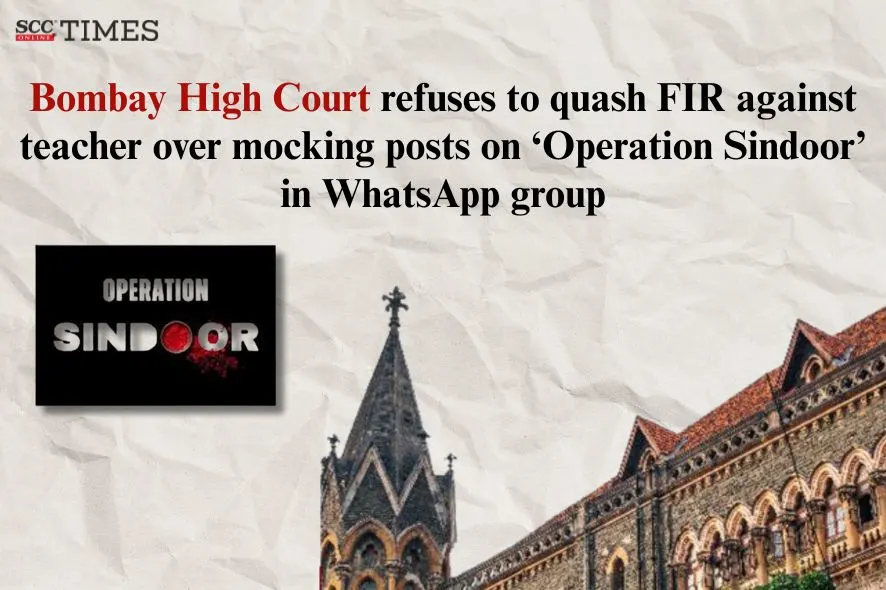Bombay High Court: In a petition filed by the accused seeking quashing of the First Information Report (‘FIR’) for posting controversial WhatsApp messages and social media status, and for reacting with a laughing emoji to the phrase “Jai Hind”, the Division Bench of A. S. Gadkari and Rajesh S. Patil*, JJ opined that the accused could have avoided such a reaction when the nation was celebrating the successful mission of the Indian Armed forces , namely “Operation Sindoor”. The Court held that the intention of the accused became an essential ingredient to be assessed in light of the language she had used for India, particularly at a time when the entire nation was expressing pride in the Indian Armed forces. Accordingly, the Court dismissed the petition, stating that the instant case constituted the necessary ingredients of the alleged offences, and therefore, the FIR was not liable to be quashed.
Background
The accused and the first informant were residing in the same Housing Society in Pune City. A WhatsApp group was created by a female member of the Society, only for the females residing in the Society which was joined by 380 female residents.
On 7-5-2025, the Indian Armed Forces carried out ‘Operation Sindoor’ against the terrorists which was being praised by the members of the said WhatsApp group, while the accused at the same time sent a message stating that, “we have T.V. and mobiles, therefore, the group should not be used as a National News Channel”. The accused then reacted with a laughing emoji on message of “Jai Hind”. Subsequently she sent few more messages on the said WhatsApp group and also updated WhatsApp status with a link of a Facebook video to which was objected by some of the members of the WhatsApp group who were known to the accused. The accused then also sent further messages which were against the Prime Minister and also against the country. This stirred up the emotions in group of people on the WhatsApp group and subsequently others going to the local police station and raising slogans, thereby insisting police to take action against the accused. Such objectionable messages on WhatsApp were then immediately deleted by the accused. Following these events, the FIR was lodged by the first informant against the accused under Sections 152, 196, 197, 352 and 353 of the Bharatiya Nyaya Sanhita, 2023 (‘BNS’). The accused later apologized to the first informant, when she expressed her condemnation towards it.
It was contended that the accused was already at loss as she was expelled from the school where she was teaching. Therefore, the accused approached the Court for the quashing of the said FIR.
Analysis, Law and Decision
The Court opined that reacting with a laughing emoji, when others in the WhatsApp group were applauding the steps taken by the Indian Government and the Indian Armed forces with respect to ‘Operation Sindoor’ and thereafter, uploading a video wherein the Prime Minister of India, has been shown sitting on a rocket and the Indian National flag burning, attracts the provisions of Section 152, 196, 197, 352 and 353 of the BNS 2023.
The Court noted that the accused told the first informant that her maternal and paternal families hail from Pakistan, and she addressed the Nation as ‘Makkar’ which itself shows mens rea behind the commission of the alleged crime. The accused who is educated and is a teacher by profession, ought to have thought about the pros and cons of sending such messages through her social media. However, upon realising the controversial nature of her posts and messages, she adopted the defence of being in a deranged mental condition. It was emphasised by the Court that intention of the accused becomes an essential ingredient to be judged with the kind of language she has used for India and more particularly when the whole country was feeling proud of our armed forces.
The Court referred to case of Ashraf Khan v. State of Uttar Pradesh1, wherein the Allahabad High Court dealt with a similarly situated case and held that “such actions are detrimental to national unity and public order”.
Accordingly, relying on the abovementioned case, the Court dismissed the petition stating that the instant case constituted the ingredients of the alleged offences, therefore, the FIR was not liable to be quashed.
[Farah Deeba v.State of Maharashtra, 2025 SCC OnLine Bom 2768, decided on: 29-7-2025]
*Judgment authored by:Justice Rajesh S. Patil.
Advocates who appeared in this case :
Advocate for the Petitioners- Harshad Sathe, Advocate
Advocate for the Respondents- M. M. Deshmukh, APP; Ratandeep Gaikwad, API
1. 2025:AHC:101873


